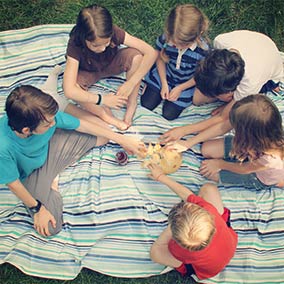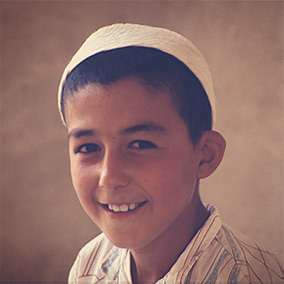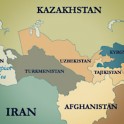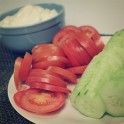Hi. I’m Hamid (hah-meed). Ramadan is an important time for my family. During this month-long observance, we join with Muslims around the world to celebrate when the prophet Mohammed received our most holy book, the Koran. When I was younger, my favorite activity was at month’s end. As children, we went door-to-door, singing for our neighbors and wishing them a happy holiday. They echoed our good wishes and handed out candy and coins.
Now that I’m 12, Ramadan takes on new meaning. It is the first time I will participate in the fast along with my parents and older brothers. Each morning, Mother will wake us up early so we can eat breakfast before sunrise. After the dawn call to prayer, we will fast all day long while we go about our daily routine of school and work – no food, water, or even gum will pass our lips. In the morning and evening, I will join my father and brothers in prayers at the mosque.
In Islamic school, I learned that fasting directs ours heart away from earthly activities and helps us focus on God. Through fasting, we develop patience, humility, and empathy for the poor who do not have anything to eat. During Ramadan, most families give food and money to those those who are less fortunate.
I think it must be very difficult to go all day without even a drink of water because it can be very hot here in the Ferghana Valley. By late afternoon, many people keep their eyes on the mosque tower, watching for the green lights to come on. These lights are a signal that we may break the fast for the evening. My family will snack on freshly baked bread and dried fruits like dates. Later, my mother and aunts will serve an elaborate dinner that includes a cucumber and tomato salad and plov (plahv), a traditional dish made with lamb, carrots, onions, and rice.
Even if fasting during Ramadan is hard for me, I want to do my best. My people believe that on Judgment Day, each person’s deeds will be weighed by our God, Allah. If I have done more good than bad, perhaps Allah will be pleased and allow me to enter heaven.

Family Activity:
Bread is sacred to the Uzbek people. Buy or bake a round, flat loaf of bread. Spread a decorative tablecloth or blanket on the floor and sit around it. Tear off pieces of the bread and pass to each person. Dip your bread in honey, jam, cream cheese, or yogurt. Read Matthew 13:33 and ask family members to raise their hand when they hear the secret word “yeast.” Explain that people cannot change their hearts by their good actions. Instead, God changes people’s hearts as yeast changes dough – from the inside out. Pray with your eyes open as the Uzbeks do, using the following requests.
Pray:
- Uzbek families try to please God and earn their way to heaven by fasting and keeping rules found in the Koran. Pray that they will understand that salvation is a true gift of God through Jesus.
- Many Uzbeks embrace Islam as part of their cultural heritage – to be Uzbek is to be Muslim. Pray that they will learn they can become followers of Jesus and keep their Uzbek identity.
Uzbek
Vegetable Salad
Central Asia
Preparation Time: 10 | Serves: 6-8
Ingredients
- 10-12 Roma tomatoes
- 2-3 cucumbers
- 4 cups of plain Greek yogurt
- salt and pepper to taste






